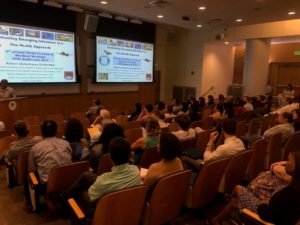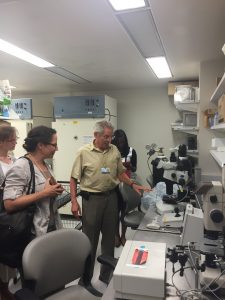GVN Short Courses Train Next Generation of Virus Researchers
GVN Short Courses Train Next Generation of Virus Researchers

GVN Short Course Participants
Worldwide, the number of deadly viral threats are on the rise. Yet the number of people entering the field of virology, including basic and medical research, around the world has been declining. “My colleagues and I have noticed a disturbing, declining trend in those entering the field of virus research,” says Robert Gallo, MD, Co-founder and International Scientific Advisor of the Global Virus Network (GVN), the Homer & Martha Gudelsky Distinguished Professor in Medicine and director of the Institute of Human Virology (IHV) at the University of Maryland School of Medicine, a GVN Center of Excellence. “This decline is unacceptable, particularly as deadly viral threats are on the rise.” GVN hopes to help counter this trend – and ensure that there are enough highly-trained virologists across the globe – by supporting and training virologists early in their careers.
“We want to motivate people,” agrees Ab Osterhaus, DVM, PhD, director of the Research Center for Emerging Infections and Zoonosis, professor at the University of Veterinary Medicine in Hannover, Germany, a GVN Center of Excellence, and CEO of Artemis One Health Foundation. “We want to show them what a big difference they can make in this field to help society,” says Dr. Osterhaus, who comes to Baltimore every year to teach at the GVN Short Course.
Education and Training Central to GVN’s Mission

Dr. Ab Osterhaus presents on a “One Health Approach” during last year’s GVN Short Course
This drive to teach is central to GVN. “Education and training is key to our mission,” says Christian Bréchot, MD, PhD, and the new president of GVN. “We want to educate the next generation of virologists.” That’s why GVN offers an annual, week-long short course designed to keep virologists apprised of the latest developments and innovations in the field and to have opportunities to interact with virologists from all over the world.
Every August for the past five years, 15 to 20 early-career scientists and physicians from around the world have gathered in Baltimore to learn about new developments and broaden their skills in medical virology from preeminent experts in the field. This year’s 5th annual GVN Short Course will take place August 5 to 11, 2018 in Baltimore, MD. The one-week intensive GVN Short Course focuses on state-of-the-art research and best practices in the field of medical virology as well as on the policies informing that work. It gives participants an opportunity to gain new knowledge, broaden their expertise, and interact with peers and experts from all over the globe.
Courses Draw From Professionals in Diverse Fields
The course draws from professionals in a variety of fields – including veterinarians, doctors and experts in virology, zoonosis and pharmacology. GVN brings these experts together so they can interact and learn from one other. “I have a background in drug discovery,” says Christina Gavegnano, PhD, an assistant professor in the Laboratory of Biochemical Pharmacology in the Department of Pediatrics at Emory University. “In recent years, I have been working in the area of drug development, and I realized I wanted to learn more about what was going on in virology.”
Prof. Gavegnano works in the lab of Raymond F. Schinazi, PhD, co-director of the Virology and Drug Discover Core at the Emory University Center for AIDS, a GVN Center of Excellence, and member of the GVN Board of Directors. She studies the use of Jak inhibitors to treat HIV infection and attended the GVN Short Course in 2015. “I really liked seeing what other people are doing,” says Prof. Gavegnano, “and I liked hearing about the discovery of HIV from the person who played such a central role in that story – Robert Gallo himself. Getting to hear him speak in person was an amazing experience.”

Dr. Marcelo Jacobs-Lorena at Johns Hopkins Bloomberg School of Public Health leads a tour of their Insectary Core Facility
A Range of Topics Covered
The GVN Short Course has covered a range of topics, including the latest research on hepatitis, Ebola, Marburg, Lassa, Zika, HIV, measles, HPV, and other viruses as well as on focus areas such as biosurveillance, bioinformatics, drug development, and a “one health” approach to combating animal virus threats. The course has also included a tour of Johns Hopkins School of Public Health’s insectary and a trip to Washington, DC to meet with policymakers and program officials from the National Institutes of Health (NIH).
“It was one of the best experiences of my life,” says Julian Ruiz-Saenz, MSc, PhD, DVM, professor of veterinary medicine at the Cooperative University of Colombia, and president of the Colombian Association for Virology, who attended the GVN Short Course in 2014. “I got to meet so many experts and researchers and to visit the NIH, which was an amazing experience because it’s one of the places that we rely on for guidance on research policy.”
Learn From Authorities on the Subject
Those who teach the courses see the value of the sessions, too. “It gives them a chance to interact with people who are setting the priorities for research in the field of virology,” says Diane Griffin, MD, PhD, professor and former chair, Department of Molecular Microbiology and Immunology at the Johns Hopkins Bloomberg School of Public Health, who has taught at the GVN Short Course every year since it began. Dr. Griffin lectures on the viral, cellular and immunologic determinants of diseases caused by alphaviruses and the measles virus, one of her areas of expertise. “People have forgotten how devastating measles is,” says Dr. Griffin. “It’s important to provide them with a perspective on how we got to where we are today.”
Dr. Osterhaus focuses on the topic of combating animal virus threats through a “one health” approach. This idea argues that viruses often treat animals and humans as interchangeable vectors for infection. “There’s a whole list of human viruses that spread from the animal world,” says Dr. Osterhaus. “We are just another animal species – that’s my message.” Dr. Osterhaus, who has discovered more than 50 new viruses in humans and animals and has helped to combat major outbreaks such as SARS and pandemic influenza, encourages attendees to take a collaborative approach to preparing for the next pandemic. “The key question,” he says, “is what can we do, how can we be prepared for the next emerging infectious diseases?”
A Global Reach
In addition to the annual course in Baltimore, GVN is working on plans to offer short courses in other places around the world. “The program in Baltimore has been excellent,” says Dr. Bréchot, “and we want to build on it and expand it to other countries as well.” Wherever the courses take place, past participants say, they want to take part. “I would love to come back,” says Prof. Ruiz-Saenz with a laugh. “Or send another Colombian researcher.”
When: August 5-11, 2018
Where: Institute of Human Virology at the University of Maryland School of Medicine, Baltimore, MD
Learn more: www.gvn.org or contact Natalia Mercer, PhD, course coordinator at [email protected]
